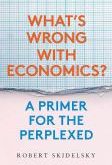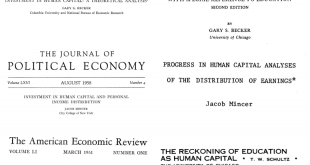from Ken Zimmerman (formerly a comment) Clearly sociopathic actions, right? “In a sociopathic society, sociopathic individual behavior is so pervasive and socially accepted that perpetrators don’t think of themselves as doing anything wrong. When cyclist champion Lance Armstrong first acknowledged in a 2013 interview with Oprah Winfrey that he had been doping—using performance-enhancing drugs—and lying about it for years, she asked him if he believed he was cheating. Oprah: Did you feel...
Read More »How economic orthodoxy protects its dominant position
from Lars Syll John Bryan Davis (2016) has offered a persuasive account of the way an economic orthodoxy protects its dominant position. Traditional ‘reflexive domains’ for judging research quality — the theory-evidence nexus, the history and philosophy of economics — are pushed aside. Instead, research quality is assessed through journal ranking systems. This is highly biased towards the status quo and reinforces stratification: top journals feature articles by top academics at top...
Read More »More on open-source versus patent monopoly financing of drug development
from Dean Baker It is often said that intellectuals have a hard time dealing with new ideas. Unfortunately, for purposes of public debate, open-source government funding of drug development is a new idea, and people in policy positions seem to be having a very hard time understanding it. So, I will try to write this post in a way that even a policy wonk can figure it out. The basic idea of government-funded research should not be hard to grasp since the government already funds a large...
Read More »A Live Conversation #15: Galahad (Stuart Nicholson, Dean Baker)
Website: https://www.galahadonline.com/ YouTube: https://www.youtube.com/channel/UCC8Af4nRKropuxAG8xKwQaA Bandcamp: https://galahad1.bandcamp.com/ Dean's Bandcamp: https://deanbaker.bandcamp.com/
Read More »Vaccinations: a new world order (3 graphs)
India and China are taking over. Cuban vaccines have entered phase three. It’s not the case that western countries are tacking the backseat. Yet. However… There are of course issues with the global vaccination effort. According to rumors, there are 29 million AstraZeneca doses produced in the Netherlands and stored in Italy which are not entering the vaccination chain because of… nobody knows (personal opinion: it sometimes feels as if the ‘intern from hell’ chairs the AstraZeneca...
Read More »The biophysical resource limits of the planet
from Ted Trainer and current RWER issue It is remarkable that the development literature has given so little attention to the “limits to growth” analysis of the global predicament. No other set of considerations has such profound implications for development in rich and poor worlds. Over the last fifty years there has accumulated an extensive and overwhelmingly convincing case that global resource consumption and ecological impacts are far beyond sustainable levels. This rules out any...
Read More »What’s wrong with economics?
from Lars Syll This is an important and fundamentally correct critique of the core methodology of economics: individualistic; analytical; ahistorical; asocial; and apolitical. What economics understands is important. What it ignores is, alas, equally important. As Skidelsky, famous as the biographer of Keynes, notes, “to maintain that market competition is a self-sufficient ordering principle is wrong. Markets are embedded in political institutions and moral beliefs.” Economists need to...
Read More »New York Times debates when it will tell readers that China has the world’s largest economy
from Dean Baker That seems to be the implication of a David Sanger piece commenting on the state of U.S. relations with Russia and China. At one point Sanger notes that China is a rising economic power: “Economists debate when the Chinese will have the world’s largest gross domestic product — perhaps toward the end of this decade” Actually, China already has the world’s largest economy using purchasing power parity measures of GDP, which is what most economists view as the best basis of...
Read More »The sentiment behind eugenics thrives in human capital theory
from Blair Fix and current RWER issue A key problem with eugenics is that it neglects the social nature of human traits. It assumes that productivity is an innate trait of the individual, and that breeding for this trait would lead to a better society. It is a seductive idea that is deeply flawed. In all likelihood, selectively breeding people for productivity would, like chickens, lead to a psychopathic strain of human. The rise of human capital theory After the horrors of the Holocaust,...
Read More »On the poverty of deductivism
from Lars Syll In mainstream macroeconomics, there has for long been an insistence on formalistic (mathematical) modelling, and to some economic methodologists (e.g. Lawson 2015, Syll 2016) this has forced economists to give up on realism and substitute axiomatics for real world relevance. According to the critique, the deductivist orientation has been the main reason behind the difficulty that mainstream economics has had in terms of understanding, explaining and predicting what takes...
Read More » Real-World Economics Review
Real-World Economics Review





